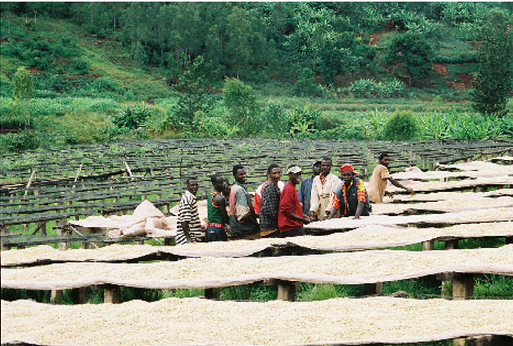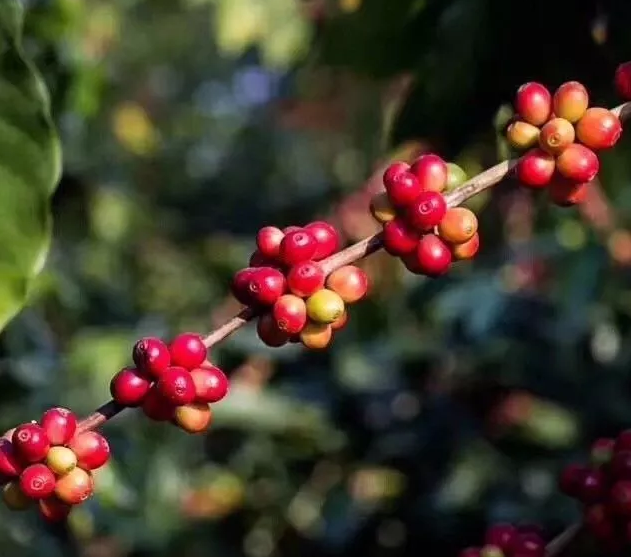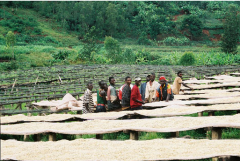Starbucks Burundian Coffee Burundian Coffee producing area introduces where Burundian coffee beans come from?
For professional baristas, please follow the coffee workshop (Wechat official account cafe_style)
Burundi is located south of the equator in east-central Africa. It is bordered by Rwanda to the north, Tanzania to the east and south, Congo (Kinshasa) to the west, and Lake Tanganyika to the southwest. There are many plateaus and mountains in the territory, most of which are composed of the plateau on the east side of the East African Rift Valley, with an average elevation of 1600 meters above sea level, which is known as the "mountain country". More than half of them are located on the famous lake Lake Tanganyika. The capital is Bujumbura. The lakeside and river valleys in the west and the savanna climate in the east; the tropical mountain climate in the central and western regions. The annual average temperature is 20-24 ℃, with a maximum of 33 ℃. The heavy rainy season is from March to May, the light rainy season is from October to December, and the other months are dry season.
Burundi has the most diverse and successful coffee industry in the world, and has its own characteristics. Coffee in this country was introduced by Belgian colonists in 1930 and is now grown only on small farms. Unfortunately, many of these farms are on the border with war-torn Rwanda, putting pressure on coffee production. Almost all coffee produced in Burundi is Arabian coffee beans, while coffee trees in Ngozi are planted at an altitude of more than 1200 meters. Burundian coffee has a rich aroma and excellent acidity, and most of its products are exported to the United States, Germany, Finland and Japan.
The origin of the town of Reuters, which is a cooperative organized by small family coffee farmers, has a total of 539 small coffee farmers, of whom 148 are women. on average, each family grows 10,200 coffee trees (at least 1000 coffee trees per hectare), which shows its weak annual income and is a typical poor small coffee farmer family.

Burundian coffee bears a striking resemblance to neighboring Rwanda, where coffee from the two countries is often confused. Burundian coffee is mainly grown in bourbon, with traditional wet processing of coffee cherries. Its boutique coffee is characterized by elegant sweetness and bright citrus aromas. This batch belongs to bourbon species micro batch.
[Bulongdi Champion processing Plant] is located in the Maerdadi Peak of the Panjia processing Plant in Cabuye District, Cajun Province, with a very high altitude, even more than 2000 meters in the mountainous area. the soil is fertile and gravelly, which is very suitable for coffee growth. it is recognized as the best coffee processing plant in Bulongdi.

Bean parameters:
Country: Burundi
Growth: 1750 m
Production area: Kayanza Kabuye
Baking degree: medium baking
Treatment method: traditional wet treatment
Variety: bourbon species
Processing plant: Parnjia processing plant
Flavor: sour citrus, lemon, orange, almond aromas
Taste: citrus acidity, lemon, orange, almond aromas, tangerine peel aromas, clean, round and balanced with a long finish.
Taobao link: https://item.taobao.com/item.htm?spm=a1z10.5-c.w4002-15673140460.41.22f7333b1ud5mF&id=532974896074
There are five major coffee producing areas in Rwanda, and the coffee produced in these five regions is slightly different in aroma and taste. The coffee from Rwanda tastes sour, but it has a lingering aftertaste. "good coffee is like Chinese tea. It feels sweet only after drinking it." Mustafari said. Starbucks, a well-known coffee chain, also imports some of its raw materials from Rwanda. Mustafari said that although Rwandan coffee has not yet officially entered the Chinese market, they are working hard and are expected to give China a taste of authentic Rwandan coffee within two years.
Rwanda is known as the "country of a thousand hills". It is full of mountains and plateaus, and most areas are tropical plateau climate and savanna climate, which is mild and cool. There are about 33000 hectares of coffee plantations and 500000 people are engaged in the coffee industry. Rwanda is the only country in the world that can fully enjoy the harmony of soil-altitude-climate. Rwanda has unique conditions for growing Arabica coffee. Fertile volcanic soil, adequate rainfall and the right temperature all year round make our coffee taste different.
The beautiful country of thousands of hills Rwanda has a long and rich culture for growing highland coffee, mainly high-quality Arabica coffee. Rwanda accounts for 20% of the total coffee production and is also very popular in the international market. In this unique growing environment, high-quality coffee from Rwanda has a distinctive taste and aroma. According to Karuritwa, marketing and promotion officer of the Rwandan Coffee Association, Rwanda plans to export 3000 tons of coffee this year, further increasing coffee production to meet the increasing market demand. Starbucks, the world's largest coffee and beverage retailer, has also partnered with the Rwandan government to import Rwanda coffee, just as a brown pigeon flies from its cup against the line "Cup of Hope".
Bourbon coffee grown in Lutesilo in the western province of Rwanda is one of the original varieties of Arabica coffee. With its high-quality washed Arabica coffee beans, it is eye-catching and more and more famous in the international market.
Like many African countries, Rwandan coffee is mainly produced by small farmers, and the ripe cherry fruits are collected and sent to the processing station every year during the harvest period. Mushonyi (Muxiuyi) processing plant has an amazing award record. Apart from winning the COE Excellence Cup in 2010, it won the championship, 12th, 16th and 28th in four batches in 2011 alone! During the annual harvest period, the ripe coffee berries picked by farmers are concentrated in the treatment station for treatment, first selected by hand to ensure that no immature or damaged fruit is mixed in. Then remove the pericarp, wash the pectin in the channel after 12-18 hours of washing and fermentation in a cool and low temperature environment. During the drying process of the scaffolding, the members of the treatment station will turn manually and take care of them carefully to ensure that the raw beans with shells will not lose moisture or dry unevenly in sufficient sunlight, until the moisture content stability of raw beans is reduced to less than 14%.
The taste of Rwandan coffee is described as "grass aroma" with tropical climate characteristics. In addition to the sweetness of fruit, this coffee also gives people a feeling of freshness, clearness and freshness. Bourbon coffee grown in Rwanda is amazing for its sweet fruit, full-bodied, unrestrained and lingering aftertaste. This coffee has a delicious, citrus sweetness and a deep chocolate color, with red apples, cherries, cinnamon and honey, high sweetness and balance, cinnamon, almonds and chocolate finish.
Indeed, coffee places the hopes of the people of Rwanda. They hope to increase coffee exports to promote the country's economic development, and they also hope that the two major tribes, the Hutu and the Tutsi, who once killed each other, will work together to grow coffee, eliminate gratitude and hatred, and jointly build a better tomorrow. After tasting Rwanda bourbon carefully, I think it tastes really good and is worth recommending.
Recommended item [Rwanda West Province Rutsiro Mushonyi CWS Bourbon]
[product name]: Rwanda bourbon boutique coffee
[quality rating]: AA
[baking degree]: recommended baking degree city or deep city baking
[grade]: good
[particles]: ★★ plump
[acidity]: ★★★ micro acid
[equilibrium]: ★★★ stable
[coffee producing areas]: Lutesilo producing areas in the western province of Rwanda
[planting altitude]: 1500-1800 m
[raw bean variety]: BM-139 (bourbon) species
[raw bean treatment]: washing, sun drying of elevated scaffolding
[flavor characteristics]: red apple, cherry, cinnamon, honey
Important Notice :
前街咖啡 FrontStreet Coffee has moved to new addredd:
FrontStreet Coffee Address: 315,Donghua East Road,GuangZhou
Tel:020 38364473
- Prev

What are the similarities and differences in the flavor and taste of coffee between Ethiopia, Burundi and Rwanda?
For professional baristas, please follow the coffee workshop (official Wechat account cafe_style) Burundi is located on the south side of the equator in east-central Africa. It is bordered by Rwanda to the north, Tanzania to the east and south, Congo (Kinshasa) to the west, and Lake Tanganyika to the southwest. There are many plateaus and mountains in the territory, most of which are made up of the plateau on the east side of the East African Rift Valley. The average elevation of the whole country is 1600 meters, which is called the mountain country.
- Next

Introduction of Burundian Coffee and East Timor, East Timor Burundian Coffee producing areas
Exchange of professional baristas Please follow the coffee workshop (Wechat official account cafe_style) what are the characteristics of coffee in East Timor? The coffee in East Timor is all organic, and the country is very poor. It is said that the farmers there are so poor that they have no money to buy fertilizers and pesticides, so there is no use of pesticides and pesticides in the coffee growth, and the growing environment is very healthy. The variety of East Timorese coffee is the original seed emperor.
Related
- Detailed explanation of Jadeite planting Land in Panamanian Jadeite Manor introduction to the grading system of Jadeite competitive bidding, Red bid, Green bid and Rose Summer
- Story of Coffee planting in Brenka region of Costa Rica Stonehenge Manor anaerobic heavy honey treatment of flavor mouth
- What's on the barrel of Blue Mountain Coffee beans?
- Can American coffee also pull flowers? How to use hot American style to pull out a good-looking pattern?
- Can you make a cold extract with coffee beans? What is the right proportion for cold-extracted coffee formula?
- Indonesian PWN Gold Mandrine Coffee Origin Features Flavor How to Chong? Mandolin coffee is American.
- A brief introduction to the flavor characteristics of Brazilian yellow bourbon coffee beans
- What is the effect of different water quality on the flavor of cold-extracted coffee? What kind of water is best for brewing coffee?
- Why do you think of Rose Summer whenever you mention Panamanian coffee?
- Introduction to the characteristics of authentic blue mountain coffee bean producing areas? What is the CIB Coffee Authority in Jamaica?

